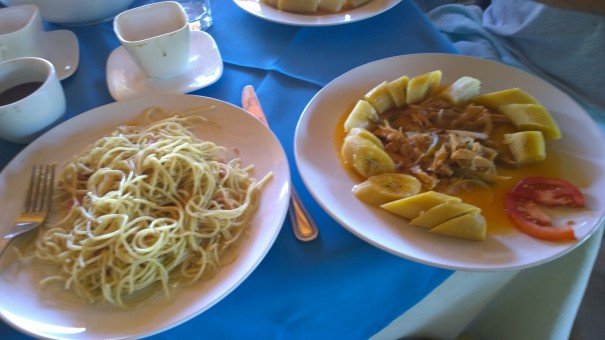
Dried Fish and Plantains in Haiti

Dried Fish and Plantains in Haiti
Haiti’s had a tough go of it since becoming a nation 110 years ago. It wasn’t a picnic 111 years ago either, but you might have hoped that the result of history’s only successful slave rebellion would have provided some time to revel, to luxuriate, and possibly even generate some kudos.
The first thing that happened, though, after some truly remarkable soldiers beat Napoleon’s army in 1803, was that the nation split in two, as two of those soldiers decided they were best fit to rule. By 1820, both were dead, their most natural trading partner, France, had anathematized them, and the U.S. made special efforts not to even mention them in print, lest the rebellious virus spread to their negroes.
Things pretty much went downhill from there, until Haiti became what we know it to be today, the perpetually poorest nation in the Western hemisphere. This has more repercussions on things like long-term health and infrastructure than it does on everyday life, though, and there are two things Haitians have in abundance: a fully justified national pride, and potential.
The former you see everywhere, from the groups of students who make the 90-minute-and-more climb up to the Citadelle, the fort outside Cap Haïtien built to ward off the French just after independence, to have an al fresco lunch with friends, to the fact that, in the face of such a lack of financial resources, there is almost no begging.
The latter, you see on this breakfast plate of dried fish and plantains. Haiti is in the Caribbean. The mountains may have been mostly denuded of its native mahogany forests to be made into the world’s most exquisitely grained charcoal, but rivers run through the country, surrounded by a bounteous sea. Beaches are lined with almond trees, coconuts, and the foothills are rife with breadfruit and chadec, a sort of green grapefruit. And though the fish don’t leap into the boats, a good morning’s fishing will produce a good morning’s haul. The roadsides are a testament to collegial fishing huddles and drying racks.
Haiti is poor, but it is not hungry. Or at least, it doesn’t have to be. Infrastructure, and meddling by folks like President Clinton, who flooded the market with cheap rice in the 1990s and destroyed the local industry, have conspired to make the country a concern to the UN’s World Food Programme. But Haiti was as prized as a French possession as it was for its agriculture; it was once the world’s largest producer of sugar. This breakfast fish, like most fish here, is just fish, the way meat is often just meat in the Middle East. It’s what they’ve got, what they’ve caught.
I had mine at La Colline Enchantée, a hotel just outside Jacmel, 100 meters or so from the sea. The sharp fish and the staid plantain were a good morning mix. Air-dried to the point of pungency, the fish provided a wake-up equal to the boldest roast of coffee. A moderately competent government and a less invasive global foreign aid industry would get the plantains and dried fish flowing in greater quantities, I thought as I ate my breakfast. A high hurdle, perhaps, but not an insurmountable one.